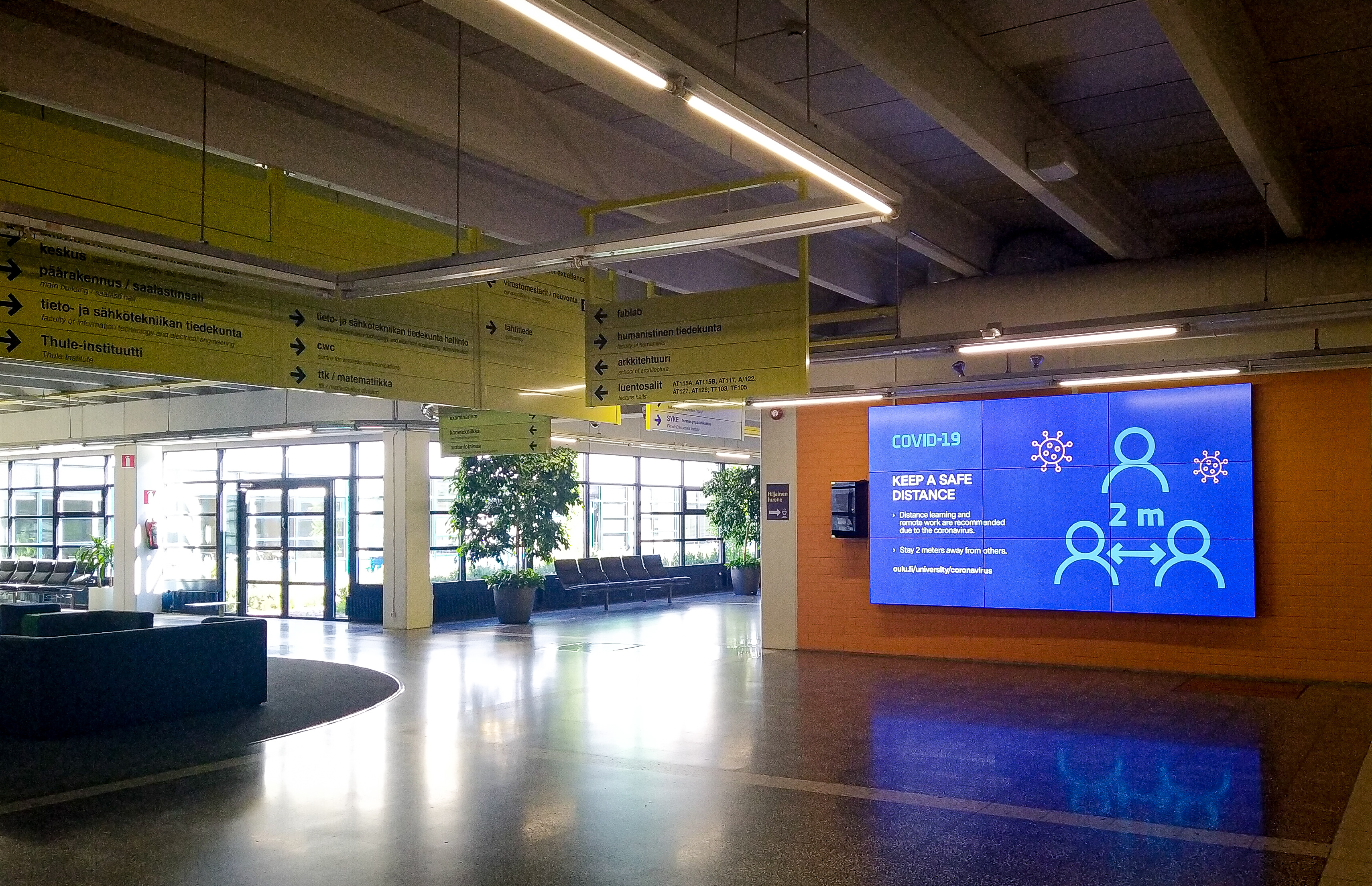In Finnish
The exceptional spring has caused stress, additional work, and slowed down studies for many university students in Oulu. The students have needed guidance and support as they have been forced into lockdown and isolation, lacking communality, and also to alleviate the anxiety and uncertainty the situation has caused.
However, most people have been satisfied with the quality of the remote teaching, and in some cases, the exceptional circumstances have even made studying easier.
This information is evident from a survey done by the Student Union of the University of Oulu (OYY). The questionnaire was answered by 1,603 students, which is roughly 12 percent of all the students of the University of Oulu. The survey was open for all degree students, doctoral students, and students in the open university.
Nearly half
of the students (47 %) who answered the survey felt that their studies have become
slightly harder due to the circumstances. Almost a quarter (24 %) of the
respondents felt that the exceptional circumstances have had a major impact on
their studies.
However, a
bit over half of the respondents (57 %) answered that they felt they had the
opportunity to progress their studies as planned, regardless of the exceptional
circumstances. Out of the respondents, 32 percent felt that their studies had
not progressed the way they wanted.
On the
other hand, 13 percent of the respondents felt that the circumstances have
helped their studies either by little (9 %) or greatly (5 %). Additionally, 15
% of the respondents answered that the circumstances have had no noticeable
effect on their studies, neither improving nor worsening them.
The University
of Oulu moved to remote or distance learning in a short timespan due to the
restrictions placed to combat the spread of the coronavirus. The gradual easing of these restrictions
began on 14 May, but remote learning continues for now. The Oulu Student Magazine
wrote about the online learning experiences of four students in an article published on 31 March.
LABORATORIES
BEHIND LOCKED DOORS
The chance
to advance studies as planned has varied from faculty to faculty. According to
the survey, the students in the Faculty of Medicine have managed to progress
their studies the best. Comparatively well did also the students in the Faculty
of Education, the Oulu Business School, as well as the Faculty of Natural
Sciences.
According
to the survey, below-average progress of studies has been possible in the
Faculty of Technology. Students have faced the most difficulties in advancing their
studies in the Faculty of Biochemistry and Molecular Medicine, in the Faculty
of Humanities, and in the Faculty of Information Technology and Electrical
Engineering.
According
to the Education Dean of the Faculty of Biochemistry and Molecular Medicine, Tuomo
Glumoff, an obvious reason for this is the nature of the studies in the
Faculty: biochemistry is something that is done in a laboratory. As the doors
to the campuses were closed in March, the teaching laboratories were closed as
well. Two courses carried out in a laboratory environment were left incomplete,
and their completion was moved to May. However, an exceptional arrangement is
still in place: at all times, the maximum number of students allowed in the
laboratory is nine students and one assistant.
For some
students in the Faculty, the experimental work for their pro gradu theses was
also halted. Glumoff states that the students who would graduate on 31 July at
the latest have been granted a special permit to enter the laboratory already a
few weeks ago, and the rest have been able to continue their work on 14 May.
“You cannot
learn laboratory skills via a correspondence course, you must be able to do the
work yourself.”
Glumoff
continues that some of the courses this spring have been modified so that they
can be completed online. For example, some practical work has been modified
into problem solving exercises, which can be figured out outside the
laboratory.
“You cannot learn laboratory skills via a correspondence course, you must be able to do the work yourself.”
Aino
Rossi, the
specialist in academic affairs of OYY, states that about four percent of the
studies this spring could not be organised remotely, for one reason or another.
Thus, they have been either moved to another time or organised on campus with exceptional
permission. Rossi also says that relocating the studies from the planned
timeslots makes advancing studies harder.
The Student
Union’s specialist in social affairs, Sanna Kangasniemi, says that some
students are worried about their income as the coronavirus has affected
employment. That in turn influences how their studies can be progressed, or if
they can be advanced at all.
According
to the survey, the uncertainty of livelihood had hampered studies slightly for
23 percent of respondents and significantly for 13 percent of respondents. Personal
reasons were cited as something that hindered studies slightly by 31 % of
respondents and significantly by 21 % of respondents.
The open
answers revealed that the personal reasons listed as having a negative effect
on the studies were, among others, factors related to stress, motivation, and the
wellbeing of self or others.
Changes in
the availability of study material and the learning environments, lack of
equipment required for the courses, increased workload, difficulties in the
practicalities of the course, uncertain income, and personal reasons were among
the negative effects the exceptional circumstances have caused.
A child
staying at home and difficulties in receiving information and guidance were
also listed as things that make studying harder.
However,
making things easier were the flexibility of the courses and how well they were
executed.
STRAIN
FROM THE QUICK CHANGE
A majority
of the respondents estimated that the move to remote learning and studying
online was slightly, reasonably, or very stressful.
Many
respondents felt that moving to remote studying and online learning in general was
strenuous. Of all the respondents, 26 percent felt this change was moderately
stressful, and 16 percent of respondents felt it was very stressful. The
situation was ‘slightly stressful’ for 28 percent of respondents.
Contrary to
that, 28 percent of respondents viewed that the shift and studying online did
not increase their stress at all.
“Weekly tasks were mentioned multiple times in the open answers. If a student has many courses with weekly exercises, it is a large change compared to having just lectures and a learning diary or an exam.”
According
to the specialists of the Student Union, the experience of stress and increased
workload can be explained by the changed methods in completing the courses.
“Weekly
tasks were mentioned multiple times in the open answers. If a student has many
courses with weekly exercises, it is a large change compared to having just
lectures and a learning diary or an exam,” says Aino Rossi.
The suddenness
of the change as well as its execution have also increased the strain towards
students.
“As the
exceptional circumstances have forced performing this so-called digital leap
quickly, there have been problems in organising the studies and uncertainty how
to do the assignments. That is something that affects one’s perception of the
workload,” Sanna Kangasniemi states.
DIFFERENCES IN COMMUNICATION IN THE FACULTIES
Communication
is often criticised in exceptional circumstances. Especially at the beginning
of the crisis the communications from the University of Oulu were criticised in
social media and on Yle’s article (13 March).
According
to the recent survey, most respondents felt that the policies and instructions
from the faculties and the University as well as information on completing the
courses were communicated to them well or very well. Half of the respondents
deemed they had received information well, and 19 percent extremely well.
However, 11
percent of the respondents felt they received information poorly, and 3 percent
answered extremely poorly. 16 percent stated that they felt they did not
receive information well or poorly, and 2 percent were unsure.
The survey
reveals that there are differences between the faculties on how well
information is relayed between various parties.
In the
Faculty of Biochemistry and Molecular Medicine, there were no students who felt
they received information poorly from the Faculty. The Faculty also performed
well in communicating how to complete the courses.
Tuomo
Glumoff states that the Faculty has organised weekly briefing sessions on Zoom
since the crisis started.
“Apart from
conveying information, the idea was that communality clearly suffers as
students are unable to enter the campuses. At least now we can meet once a week
on Zoom. This has had multiple benefits: the students receive up-to-date
information and answers to their questions. Additionally, thanks to suggestions
from the students, two courses are now held as summer studies, and we would not
have done this otherwise.”
According
to the survey, communications were handled reasonably well in the Faculty of
Education and the Faculty of Medicine.
The survey
shows that communicating policies and instructions was done moderately in the
Faculty of Information Technology and Electrical Engineering, the Faculty of
Technology, the Faculty of Natural Sciences, and the Faculty of Humanities.
Comparatively,
the survey reveals that the poorest faculty in terms of communicating the
policies and instructions was Oulu Business School. The Faculty also received negative feedback on informing
the students how to complete the courses.
Why has
there been disruptions in the flow of information?
Janne
Järvinen, the
Education Dean of the Oulu Business School and professor of accounting, states
that the Faculty has many subjects that vary amongst themselves, and the
courses are completed in multiple ways. This might be the reason for the
confusion in communications, Järvinen ponders.
The
responsibility of relaying the information to the students has been on the
teachers of the courses. Information has also been passed on through the
student society Finanssi.
“[The
Faculty] did not organise our own info sessions, though we could have. Also, FMBB
is a smaller faculty than us. We have been in contact with the student society
and we thought that information will be passed on through them. We have had
some constructive discussions with Finanssi. For sure, [communications]
could have been done differently,” Järvinen says.
Järvinen
also remarks that the quickly changing situation not only stresses the students
but teachers as well. In such a rapid change, additional resources or a few
helping hands would not have gone amiss.
“Everyone
has been busy with teaching. I had a few courses that had to be moved online
within a few days. There can be a large bachelor-level course with hundreds of
students, and the alternative teaching methods had to be invented in a few
days. I understand that the situation has been extremely challenging, but we
made through it reasonably well.”
Lotta
Leinonen, the board
member in charge of academic affairs for the student society Finanssi, says
that the organisation is also gathering data through their own survey, made in collaboration
with the Business School.
The survey,
aimed at members of the student society, is open until the end of May, but
based on the answers so far, few points seem to be repeated.
According
to Leinonen, the general picture on how the teaching has been organised is a
positive one. In particular, streamed lectures and thesis guidance have
received positive feedback. “Especially in master’s level there are courses
that have received commendations.”
Leinonen
continues that especially for first-year students there have been some courses
with very little online teaching, or courses where an exam has been replaced by
weekly assignments. Leinonen says that these lower the overall grade of the
feedback.
“If you
cannot get in contact with [the teacher] of the course or the workload has
increased, it reflects instantly in the results of the survey.”
Situations in which students have been informed late on changes in exam practices have received criticism in the survey by Finanssi. There is also some feedback that on some courses the teaching has been organised almost the same as in normal conditions, but on some courses, there are no lectures at all.
“Why are there courses where the teaching could be transferred completely online, and others where this could not be done?”
STUDIES
ARE NOT FLEXIBLE FOR EVERYONE
The
increase in workload and the flexible arrangements of courses also varied
between the faculties.
The
detrimental effect of the increase in workload was experienced mostly by the students
of the Faculty of Education, the Faculty of Humanities, the Faculty of Natural Sciences,
and Oulu Business School.
The best comparative
results were achieved in the Faculty of Biochemistry and Molecular Medicine as
well as in the Faculty of Medicine.
The Faculty
of Biochemistry and Molecular Medicine was also above the average in the
flexibility of the courses, along with the Faculty of Information Technology
and Electrical Engineering. The lack of flexibility seemed to affect the
students in the Oulu Business School and in the Faculty of Humanities the most.
In Oulu
Business School, 19 percent of the responds estimated that the lack of
flexibility had made their studies more difficulty, and 14 percent thought
their studies were significantly harder due to the lack of flexibility.
The
Education Dean Janne Järvinen states that the structure of the studies has an
effect on their flexibility. On bachelor level, there are less opportunities to
have flexible studies or alternative methods for completing the courses.
Järvinen
says that many of the respondents have been precisely bachelor-level students.
That influences how the workload of the studies is perceived. Overall, the need
for support and guidance is greater at the beginning of the studies, and in
these exceptional times this demand only increases.
According
to Lotta Leinonen, the lack of flexibility as well as the cancellation of work
practice and internships has also affected the studies.
“Worry has
been caused by the coronavirus taking away student’s internship, and by the
fact that the mandatory work practice cannot be replaced by any other course:
hopefully this will not affect students’ graduation.”
Järvinen
says that the competitive nature of the bachelor-level courses also influences
the experience.
“How one
manages on some of the courses during bachelor’s level decides the entry into
the most popular major subjects. Some students experienced that their workload
increased, and at the same time, they have had pressure to get good grades.”
This
competitive aspect is something the Faculty is unable to change: “There are
limited number of places in the major subjects, and if there are more
applicants than places, there is a competition that will be determined by the
grades. I think that those with not that high level of academic proficiency view
the situation as stressful.”
Lotta
Leinonen says that changing the way the courses are completed, with weekly
assignments instead of an exam, has been a cause of stress for bachelor level
students.
“Previously,
with only an exam, it has been relatively easier to estimate how much one needs
to do to get a good grade. Now, with weekly assignments replacing the exam, it has improved
learning, but if a student has high ambitions, that has increased the pressure.
The weekly tasks make it harder to estimate what are the requirements for a
good grade. Therefore, it has caused even more stress for those who already
stressed about the situation.”
WHAT
ABOUT REMOTE TEACHING ITSELF?
The survey
shows that remote or distance teaching has worked comparatively well in the
University of Oulu, but the results vary between the faculties again.
Out of the
respondents who have had online courses, 67 percent felt they worked well or
extremely well.
However, 12
percent of respondents deemed distance learning to have worked poorly, and
three percent answered that it has worked extremely poorly. Based on the
survey, above average results were achieved in the Faculty of Medicine, and the
worst results were in the Oulu Business School.
The Finnish
Medical Journal Lääkärilehti reported on 24 April that medical students around
Finland have been reasonably happy with their studies and how they have been organised.
Maintaining routines, organising schedules, and managing life in general are among things that are made harder by studying at home, according to many respondents of the survey.
Other
challenges listed in the answers of the survey show that especially things
related to mental health, life management, income, and organising teaching had made
studying harder.
The answers
also were related to employment: the respondents had difficulties in organising
work practice, problems in acquiring income, and fears of delaying their studies
and graduation. There were also mentions of the difficulties in communications,
receiving information, and contacting the teachers responsible for the courses.
Maintaining
routines, organising schedules, and managing life in general are among things
that are made harder by studying at home, according to many respondents of the
survey.
The survey
also investigated the functionality of the various ways of completing the
courses.
Home exams along
with exams in Moodle were deemed to work well, as well as other written
assignments, such as essays, reports, referrals and summaries. Doing remote
group work was evaluated as the worst option.
Apart from the challenges, the survey also aimed to bring forth some successes during the spring. Most of the positive comments from the students were related to remote teaching and online lectures and seminars, and the respondents complimented the fluency of the courses and the knowhow of the teachers in managing the necessary tools.
Especially recording the lectures was deemed important, as the possibility of returning to the things discussed during the lecture was seen as making learning easier, as well as bringing flexibility to the time management of studies.
Special
praise was also passed on to some of the tools and spaces for online studying,
such as the arrangements in the IT services and the library Pegasus, and the
online environment Moodle as well as the conference tool Zoom. Individual
teachers and faculties were also complimented for working exceptionally well.
ADVANCING
IN STUDIES AND RETAINING HIGH QUALITY
Even though
the survey by the Student Union reveals that communications, flexibility, and
stress have received criticism, the students in Oulu Business School have
managed to advance their studies and their graduation has not been delayed.
This is
something Janne Järvinen considers important.
“Following
the weekly assignments, it seems that the percentage of submissions has been
high, and they seem of high quality. From a Faculty point-of-view this is a
good thing.”
“There were
some perceptions that the workload had increased. Let’s put it this way:
working is good for you. Or was someone expecting things to get easier in a
situation like this?”
Could the
Business School introduce some more flexibility in the future? According to
Janne Järvinen, there is a large difference in how the bachelor’s and master’s
studies are organised. According to him, the bachelor’s program is a clear “pipeline”
that cannot be altered with the current number of students and teachers.
“The
teaching is practically controlling large masses of students. In the bachelor’s
studies, the challenge is that the teaching should be of high quality
regardless of this. I am sure that our studies are high-class, but their size
brings forth the special characteristics.”
However,
the “master-level studies can have completely different systems in use.”
As an
example of alternative ways of completing the courses during master’s level,
Järvinen mentions the master’s seminar he held online. Participating remotely
works well for those who work along their studies, as now they do not have to
take a full day off to participate in the seminar.
Janne
Järvinen says that introducing alternative methods for completing the courses
is hampered by the requirement of being effective. One must achieve results,
which means finished degrees.
“Having
different methods for completing the courses would create additional delays in
the process. We must put out a large number of students quickly and with high
quality. That is the reality of the situation, as the field of business has a
small multiplier in the financial model of the University.”
The cost
for the University of arranging teaching varies from field to field. For
example, the equipment the teaching requires, and the amount of contact
teaching the courses have affect this. Some degrees are more expensive than
others for the University, and these are taken into account in the funding
model by a larger multiplier.
If remote
teaching continues in the autumn as well, the survey by Finanssi reveals
that their members would like to see more online lectures and more information
on how to complete the courses and their structure and scheduling. On the other
hand, streaming lectures could be used in corona-free times as well, as they
allow students who work to participate on courses that have mandatory attendance,
Leinonen says.
Janne
Järvinen says that the Business School will examine the results of the surveys
in the bodies of the Faculty.
“We are
very interested in hearing what the surveys show.”
WHAT’S
NEXT?
The results
from the survey by the Student Union require actions, Sanna Kangasniemi judges.
The results have been forwarded to the University, and the report has been
published in its entirety on OYY’s website as well.
“Of course,
at the moment we only have data on these exceptional circumstances. It would be
intriguing to have information from normal times as well. There are some
results that have been reacted to even before the survey was made. Now more
emphasis will be placed on them.”
“We do not know how long the situation lasts. The students have wished that practices that work well in these times would be continued even after the coronavirus has passed.”
The
flexibility of the studies that was praised in the results of the survey is in
accordance with the Student Union’s policies, says Kangasniemi. OYY will
continue to push more flexible studies in the future as well.
“We do not
know how long the situation lasts. The students have wished that practices that
work well in these times would be continued even after the coronavirus has
passed.”
Has the
Student Union received feedback on advocacy work during the pandemic?
Sanna
Kangasniemi says that the open answers in the survey only had a few questions
regarding why OYY does nothing.
Aino Rossi
says that she has not received any direct feedback. There have been some requests
for help, and those are desirable. Rossi has been answering questions about
exams and theses, for example. “Theses are critical when you are graduating.”
International
students have been worried about tuition fees for the upcoming autumn period.
The socio-political
problems the students have faced are, according to Kangasniemi, student grant,
layoffs, and for students with families how to raise the student grant if one
is forced to stay at home with a child.
Kangasniemi
says that a similar survey would be an interesting thing to do in the autumn,
whether the remote learning continues or we are back into regular daily life.
“That would show what changes have been made.”
OYY’s corona survey
»A survey about the effects of the coronavirus was open between 3–11 April. The survey was sent via email to all students at the University of Oulu (degree students, doctoral students, and students at the open university)
»The survey was answered by 1603 students (12 percent of all students of the University)
» A vast majority (93 percent) answered in Finnish, only 7 percent in English
» Responses were received from each faculty
» According to OYY, the survey findings are presentable especially regarding the Faculty of Biochemistry and Molecular Medicine. Slightly over-represented in the survey were the students in the Faculty of Medicine, and slightly under-represented were students in the Faculty of Technology and the Faculty of Information Technology and Electrical Engineering.
» The University of Oulu Graduate School (UniOGS) was marked as their faculty by 2 percent of the respondents. The results of the survey are grouped by faculty, and it includes doctoral students as well.
» The whole survey can be found on OYY’s website in both Finnish and in English
Read more: 5 reasons why remote studying is terrible
Translation: Kalle Parviainen











